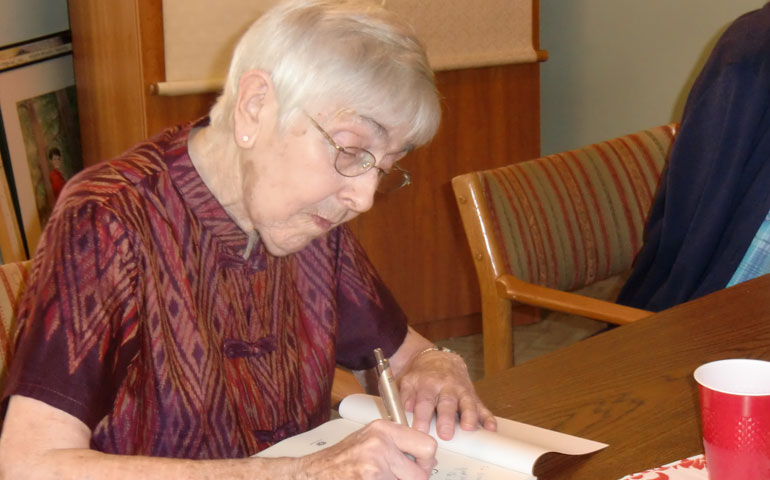
Irene Mahoney (Patricia Lefevere)
NEW ROCHELLE, N.Y. -- In all candor Irene Mahoney just wanted to be famous, a writer and a nun.
 “To be a writer was in every sense a vocation to me, much more than a profession,” the 91-year-old Ursuline sister said at her College of New Rochelle campus home. She graduated from the college, and taught there for three decades: writing, and English and French literature. She has written 18 books, including four novels, four plays, three biographies and three histories of the Ursuline sisters -- in China, Thailand and Montana. Her latest, China Dreams, was released in June, written from notes and memories of teaching in a Taiwan modern languages college in 1980-83.
“To be a writer was in every sense a vocation to me, much more than a profession,” the 91-year-old Ursuline sister said at her College of New Rochelle campus home. She graduated from the college, and taught there for three decades: writing, and English and French literature. She has written 18 books, including four novels, four plays, three biographies and three histories of the Ursuline sisters -- in China, Thailand and Montana. Her latest, China Dreams, was released in June, written from notes and memories of teaching in a Taiwan modern languages college in 1980-83.
Her life as a woman religious was not preordained. She was educated at an experimental elementary school on Long Island, has little record of receiving the sacraments, had no formal CCD training, hated her Catholic all-girls boarding school, and the Ursulines found her resumé wanting “in a steady pursuit of virtue.” She graduated from high school at 16, finished college in 1941 and worked for Prentice Hall publishers.
She rented an apartment in Manhattan and began to date. “Ultimately I received a grudging assent from religious authorities and, ‘leaving the world,’ I entered the Ursuline novitiate in 1943,” Mahoney said. College teaching and her graduate work at Fordham University (a master’s in Victorian poetry) and The Catholic University of America (a doctorate, Herman Melville) didn’t dissipate her desire for the writing life. It simply left no time for it, except in diary format.
In hindsight, she recognized that religious life before the Second Vatican Council had little room for the nun-as-writer.
It began when her superior assigned her to produce a pamphlet on Marie of the Incarnation, who brought the Ursuline order to North America. Mahoney researched with gusto, traveled during summer breaks to Marie’s native France and to the Ursuline Generalate in Rome.
Her superior changed, but Mahoney kept digging. After 13 years her pamphlet had grown to a 600-page manuscript. “In my superb innocence I put it in a discarded typing paper box, wrapped it in brown paper and sent it to Doubleday -- the only publisher I knew with a Catholic books department.” In less than a month she received a letter and an invitation to come in and chat about a contract.
“Joy knocked me off my feet and I took to my bed with the worst headache I had ever had,” Mahoney recalled. Confessing her secret to her superior raised no eyebrows. “She neither congratulated me nor reprimanded me,” but gave her the train fare into New York and assigned another sister to go with her.
 A single issue from Doubleday does not assure fame, and certainly not fortune, Mahoney admitted. But it led to her being asked to write a life of French King Henry of Navarre, and of Catherine de Medici. She was also able to publish the selected writings of Marie of the Incarnation, who brought the Ursulines to Quebec, Canada, in 1639 and told the story of Ursulines in Montana in the 1880s in the book Lady Blackrobes: Missionaries in the Heart of Indian Country. Later, Mahoney spent long periods in Thailand and in China, “incognito,” researching the missionary efforts of the teaching Ursulines.
A single issue from Doubleday does not assure fame, and certainly not fortune, Mahoney admitted. But it led to her being asked to write a life of French King Henry of Navarre, and of Catherine de Medici. She was also able to publish the selected writings of Marie of the Incarnation, who brought the Ursulines to Quebec, Canada, in 1639 and told the story of Ursulines in Montana in the 1880s in the book Lady Blackrobes: Missionaries in the Heart of Indian Country. Later, Mahoney spent long periods in Thailand and in China, “incognito,” researching the missionary efforts of the teaching Ursulines.
 Mahoney renegotiated her college contract to allow her to teach four courses one semester and pursue research and writing in the other. She wanted to write fiction, and her literary agent encouraged her. Mahoney was close to retirement when Berkeley paperbacks published her first novel, a mystery, Seven Sons.
Mahoney renegotiated her college contract to allow her to teach four courses one semester and pursue research and writing in the other. She wanted to write fiction, and her literary agent encouraged her. Mahoney was close to retirement when Berkeley paperbacks published her first novel, a mystery, Seven Sons.
Fearful of her academic colleagues’ possible scorn, she published under a pseudonym, Angela Simon. What mattered, she said, was not the little fame or remuneration but that she’d discovered her gift for writing dialogue. “I had found my voice in the voices of others,” she said. “The exhilaration from writing fiction is so much higher than what comes from publishing other books.”
In the late 1970s, in the company of other scholars, academics and published authors working in the New York Public Library, “everyone wanted to know what happened to all the good sisters after Vatican II, where had all the nuns gone,” she said. The result of their inquiries was Mahoney’s Accidental Grace, the story of 17 nuns -- each with a distinct voice, yet all women, all mature, all teachers, all trained in the same religious mode and for the most part from the same economic strata.
 As she approached her 60th birthday, she wrote to her Ursuline superiors in Rome volunteering for service abroad. She was sent to Kaohsiung, Taiwan. In diary jottings from that time, Mahoney said that facing the chill of approaching old age, she foresaw the danger of a life free from challenge. “There was such a thing as too much comfort,” she wrote. “I feared to lose energy, to blunt my purpose with too much security. I feared routine might replace thought, that the daily realities of an elderly life would obscure the mystery and wonder about me. … I did not want anything to be lost.”
As she approached her 60th birthday, she wrote to her Ursuline superiors in Rome volunteering for service abroad. She was sent to Kaohsiung, Taiwan. In diary jottings from that time, Mahoney said that facing the chill of approaching old age, she foresaw the danger of a life free from challenge. “There was such a thing as too much comfort,” she wrote. “I feared to lose energy, to blunt my purpose with too much security. I feared routine might replace thought, that the daily realities of an elderly life would obscure the mystery and wonder about me. … I did not want anything to be lost.”
That was 30 years ago and in another country.
During her late 80s and into her 90s, Mahoney has endured two spinal operations, developed macular degeneration and buried her best friend. But she has also published three books. Besides China Dreams, there are her reflective essays in Encounters, and Solo Voices, “a novel of forgiveness.”
She has not yet tackled her obituary. But the images of “God” and “Mammon” with which she wrestled for years have slipped away, “one as false as the other,” she said. “There was no need to choose. It was all one, as I was one.” The wonder of her life, she continued, “is that everything fit … the writer and the nun; some watercolors, some pencil sketches, a pastel or two. Images of a life.”
For Mahoney’s readers the gift unfolds on her pages -- the writer never fearing to go where her imagination and contemplative spirit directs her.
[Patricia Lefevere is a longtime contributor to NCR. She writes, lives and teaches spiritual autobiography writing in Englewood, N.J.]



